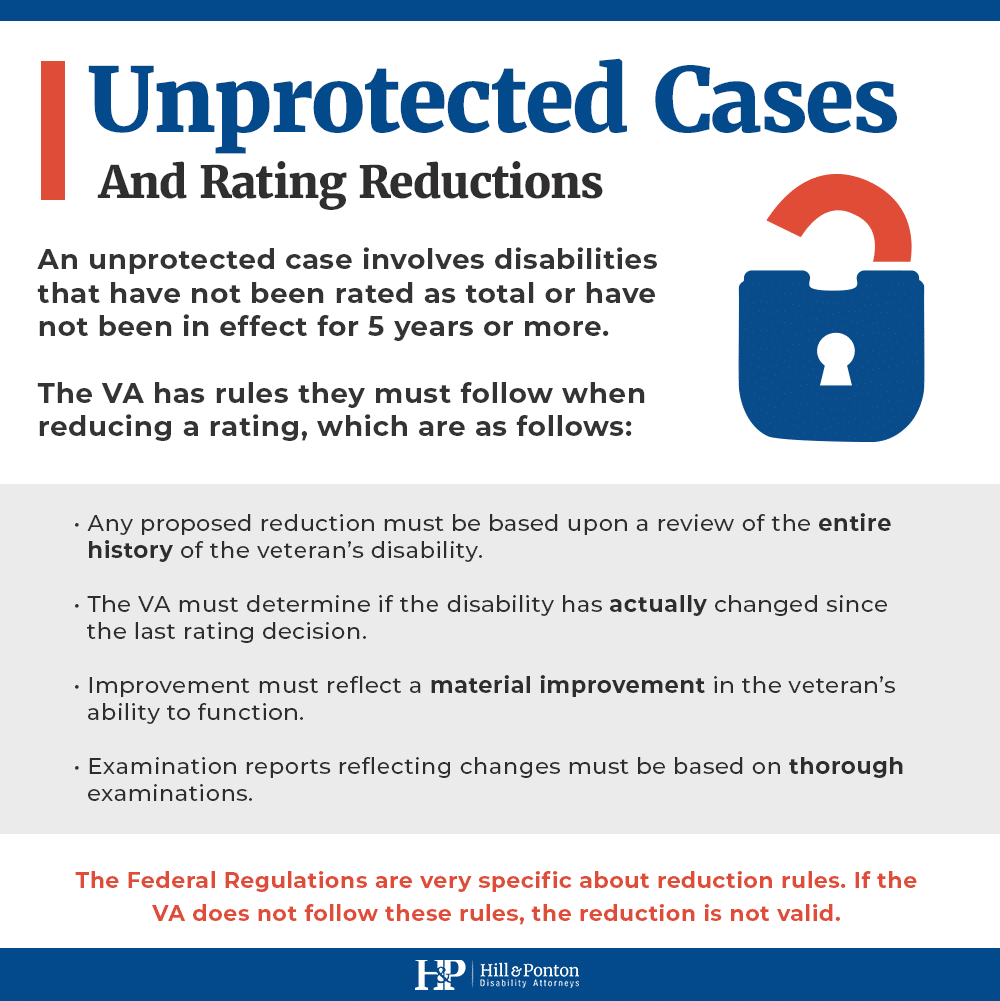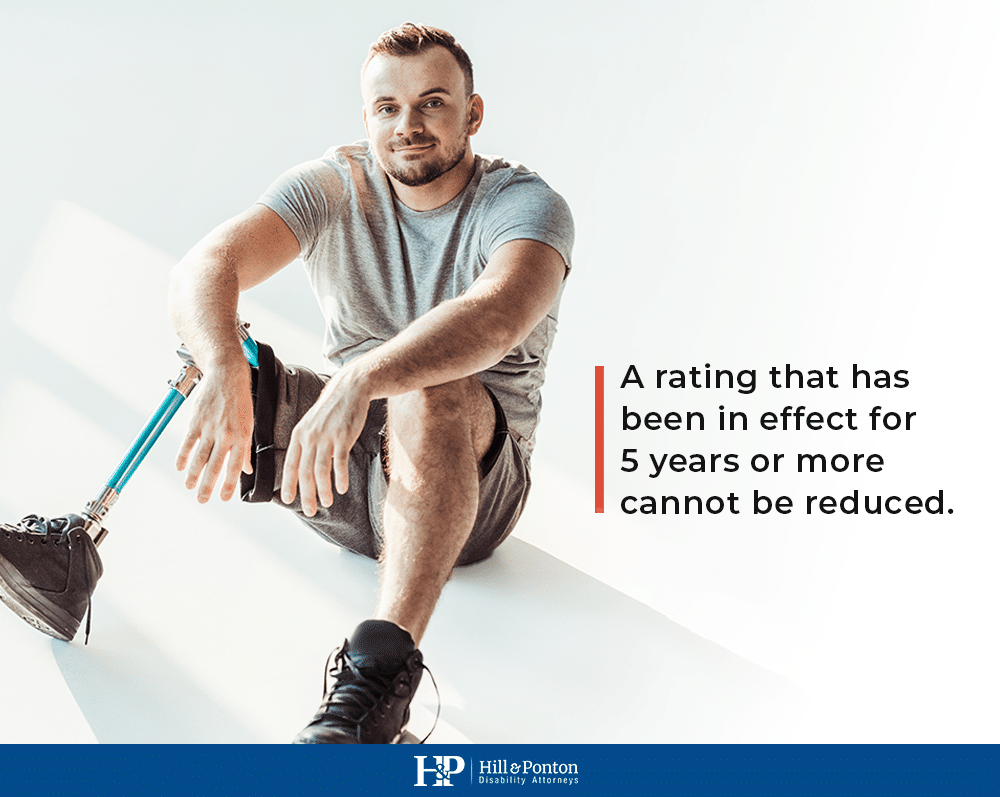Many veterans fear having their ratings reduced. But what goes into a VA rating reduction on your VA disability benefits?
If the VA finds that the veteran’s disability has decreased in severity, then a VA rating reduction may be proposed. In some cases, they may even terminate the service-connected disability compensation entirely.
However, the VA is only allowed to reduce a veteran’s disability rating under certain circumstances and when allowed by law.
There are legal requirements to meet to reduce military service benefits and the VA has the responsibility to prove that the VA rating reduction is warranted.
There are some situations where the veteran’s rating is protected and the VA is prohibited from reducing a rating (unless there was fraud on the veteran’s part). A protected rating guarantees the veteran benefits at a certain minimum level for the rest of the veteran’s life.
In other cases, there are certain requirements to meet before the VA can lawfully reduce a disability rating level. If the requirements are not met, the benefits that were improperly reduced have to be reinstated.

Rating Reductions in Unprotected Cases
An unprotected case involves disabilities that have not been rated as total or have not been in effect for 5 years or more
In cases involving disabilities that are not protected, the VA still has rules that they must follow in deciding to reduce a rating.
We discussed these general rules in the previous blog post on this topic. These rules include the following:
- Any proposed reduction must be based upon a review of the entire history of the veteran’s disability
- The VA must determine whether there has been an actual change in the disability since the last rating decision
- Any improvement must reflect a material improvement in the veteran’s ability to function under the ordinary conditions of life and work
- Examination reports reflecting any such change must be based on thorough examinations
In addition, the VA Procedures Manual (M21) provides further requirements that the VA raters must follow when adjudicating rating reductions:
- The VA must outline the time period during which the condition is said to have materially improved
- The VA must cite evidence of sustained improvement after one review examination (C&P) or show that evidence predominantly demonstrates sustained improvement based on more than one exam.
- The VA must explain why it is reasonably certain that improvement will be maintained under the ordinary conditions of life
The Federal Regulations are very specific about reduction rules. If the VA does not follow these rules, the reduction is not valid. When the reduction is not valid, the VA must reinstate the rating.
For example, 38 C.F.R § 4.13 states that “when any change in evaluation is to be made, the rating agency should assure itself that there has been an actual change in the conditions, for better or worse, and not merely a difference in the thoroughness of the examination or in use of descriptive terms.”
This means that the VA has to prove, without the shadow of a doubt, that the condition has materially improved—and improved under ordinary conditions of life as in, not due to extended bed rest or a low-stress, low-key routine.

When are my ratings protected from reduction?
The VA has identified special cases in which certain ratings are protected from a reduction in the absence of extenuating circumstances. These special cases are described as follows:
- A rating that has been in effect for 5 years or more
If a rating has continued at the same level for five years or more, it is considered “stabilized.” It doesn’t matter what the rating is, the VA cannot reduce benefits unless all of the evidence of record shows sustained improvement in the disability.
This means that the VA is not allowed to base its decision to reduce your ratings on just one examination.
If one C&P exam is taken out in isolation from the rest of the record, and that one exam says that the disability has improved while the rest of the records do not show that, the VA cannot base their proposal of a VA rating reduction on that one exam.
In accordance with 38 C.F.R. § 3.344(a), the VA must consider “the entire record of examinations and medical-industrial history […] including all special examinations indicated as a result of general examination and the entire case history.”
That is not all. Furthermore, in the event that the entire case history reflects a material improvement in a mental or physical condition, the rating board has to consider “whether the evidence makes it reasonably certain that the improvement will be maintained under the ordinary conditions of life.”
In other words, the VA would have to prove that the improvement of the condition would remain improved under the ordinary stresses, illnesses, etc. of daily life.
If there is doubt as to whether or not a) the condition has improved or b) the condition would remain improved under the ordinary conditions of life, the VA should continue the current rating.
This requirement to consider the entire medical history also applies to conditions that can be subject to temporary or episodic improvement, such as ptsd, manic depression or other psychosis, epilepsy, psychoneurotic reaction, arteriosclerotic heart disease, bronchial asthma, gastric or duodenal ulcer, some skin diseases, and other service connection disorders.

20 years of continuous disability rating
If a VA disability claim has been rated at a particular level for twenty years or more, the VA cannot reduce the rating below that level. The only exception to this is if there was fraud. If the rating fluctuated for twenty years, it can’t be reduced below whatever the lowest rating was during those twenty years.
For example, if a veteran’s mental condition was originally rated at 30%, and fluctuated between 30% and 70% over the next twenty years, the VA cannot reduce the rating of the mental condition to a rating below the original 30% after that 20-year mark, unless it is proven that fraud was involved.
If you were given a retroactive increase, like the VA made a mistake in your rating and the effective date goes back twenty years, then that rating is protected. In this case, it doesn’t matter if the disability has changed.
This rule also applies to CUE claims. If it was determined that, due to a Clear and Unmistakable Error, a veteran would receive a retroactive rating increase of twenty years or more, that rating would be protected from reduction later on down the road.
Total disability evaluations
If a veteran has been granted total disability rating through 100%, in order to reduce the rating, the VA has to decide whether there has been material improvement in the condition. Without a va examination confirming this, the VA cannot reduce the veteran’s rating.
The VA has to look at both the evidence that warranted the 100% evaluation, and the evidence it’s using to reduce the rating. If there has been no improvement at all since the date of that last examination, the VA cannot reduce.
The keyword is “material improvement.” According to the VA’s internal adjudication procedures (the M-21), total ratings cannot be reduced without medical evidence showing material improvement in the physical or mental condition.
This means that the VA has to prove two things: 1) that the improvement was substantial and not minimal, limited or inconsequential; and 2) that material improvement was attained under the ordinary conditions of life while working or actively seeking work.
Likewise, the VA adjudicators must also consider whether the material improvement was attained by bringing the symptoms under control by prolonged rest or generally by following a regimen in which maintaining employment would not be possible.
It doesn’t matter if there has been some improvement; the question is whether that improvement has been “material.” It doesn’t matter if your symptoms still meet the 100% rating criteria; it only matters if the condition has materially improved.
If the veteran was rated at 100% and a reduction is warranted, the veteran can still qualify for TDIU. Under TDIU, the VA may not reduce the benefits unless the evidence is clear and convincing that the veteran is capable of actual employability.
Ratings that have been evaluated as total at 100%, or are being paid at the 100% rate due to Individual Unemployability (IU), are protected from reductions unless there is clear and convincing evidence to prove that the condition has materially improved or that the veteran can now maintain substantially gainful employment.
This protection, however, does not apply to Temporary 100% ratings due to convalescence or to pre-stabilized ratings (under 38 C.F.R. § 4.28, 4.29, and 4.30).

Can VA Reductions Be Done after Reexamination?
Running awards are disabilities that are not static and that may improve or worsen over time. The VA may periodically schedule a reexamination so that the VA can assign an evaluation that accurately reflects the present level of the claimant’s disability.
After the RO reviews the examination report, the claimant’s evaluation may be increased, reduced, or continued at the same level.
If the VA decides to reduce the rating, based on a C&P examination, the VA is required to issue a notice of proposed reduction.
However, the VA is not required to notify the claimant of an award reduction if the reduction does not result in an alteration of the veteran’s current monthly compensation.
How do VA rating reductions happen?
When the VA wants to reduce your rating, they must give you notice of the proposed VA rating reduction. That notice must be specific enough for you to know why your rating is being reduced.
The VA must give you or your dependents at least 60 days after the notice of disagreement or notice of proposed reduction to submit evidence showing why the proposed rating should not be reduced.
It should be noted that a notice of proposed reduction is not a final decision and cannot be appealed at this point.
If the veteran does not respond within 60 days, the RO will issue a final decision that enforces the proposed reduction. The VA will then begin the adjusted payments 60 days after the decision is issued.
You also have 30 days to request a higher-level review hearing at the regional office, where the proposal will not be implemented until after the hearing, buying you a little bit more time to submit the evidence you need.
If you don’t request a hearing and you don’t submit evidence within those 60 days, a final rating decision will be issued reducing the benefits. The reduction will then take place another 60 days later, taking effect on the last day of that month.
If the veteran submits evidence within those 60 days, the RO is required to review that evidence and determine if the nature of the evidence establishes a reasonable basis for re-evaluating the condition.
Likewise, if the veteran requests a hearing within 30 days of the date of the notice, the VA cannot begin to enforce the reduction until the hearing has taken place and a final decision has been issued.
The VA, in its own way, recognizes that veterans suffered for our country and worked so hard to obtain the benefits that they so rightly deserve. So it would not be fair for VA adjudicators to reduce ratings—and ultimately monthly compensation—because they felt like it or happened to be in a bad mood that day.
The strictness of the Federal Regulations is meant to prevent reductions from happening left and right. However, in the event that a veteran does receive notice of a proposed reduction, the veteran would benefit greatly by obtaining an expert opinion from a doctor or specialist to prove that the reduction is not warranted.




